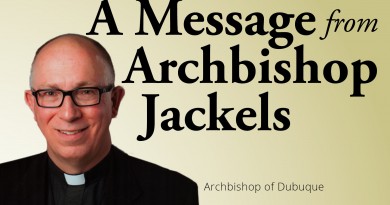Church teaching on capital punishment and Pope Francis’ recent remarks
By Archbishop Michael Jackels
Witness Publisher
Earlier this month, on the occasion of the 25th anniversary of the publication of the Catechism of the Catholic Church (CCC), our Holy Father Pope Francis – long may he live and continue to serve us so well – made remarks in which he said that capital punishment is always contrary to the gospel.
That is a significant statement, representing a further development in the understanding and teaching of the living reality of the deposit of our Catholic Faith.
When the CCC was published in 1992, Pope John Paul II said that a catechism should faithfully present Church teaching, but also help to illumine with the light of faith the new situations and problems which had not yet emerged in the past (Fidei Depositum 2).
In 1997, Pope John Paul II drew on that illumination to amend the CCC regarding capital punishment. The text was revised to read that the cases in which the execution of the offender is an absolute necessity [in order to defend public order, protect people’s safety, and prevent crime] are very rare, if not practically non-existent (2267).
Pope Francis, drawing on the same illumination, takes this one step further, saying that the execution of the offender is always contrary to the Gospel, and so immoral.
Pope Francis gave as the reasons why, that capital punishment involves a free decision to suppress a human life that is always sacred to God. It also attacks the dignity of every person from the moment of conception until natural death (including, I would say, debasing the dignity of people who celebrate the execution, or who demand it for vengeance sake).
What’s more, the Pope’s statement about the morality of capital punishment, and the reasons he gave, are consistent with the authoritative moral condemnation of other attacks on human life and dignity, such as abortion, embryonic stem cell research, and physician assisted suicide – they are always contrary to the Gospel, and so immoral.
The Pope’s statement does not ignore the victim of heinous crime; no, the Church exists to minister the compassion and healing grace of Jesus. Nor does this teaching deny the duty of the State to safeguard the common good; it is just to punish crime, just not by imposing the death penalty.
This is not a change of doctrine, no more than what Pope John Paul II taught in 1997; rather, it represents esteeming the Gospel over law, as well as making progress in understanding those things present in the Word of God but which have not yet come to light, and applying gospel teaching to contemporary life.



